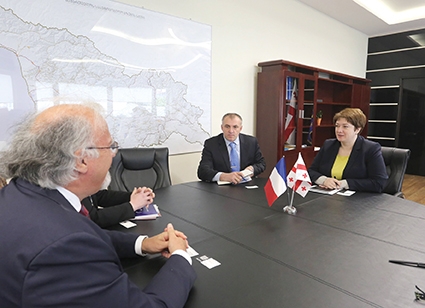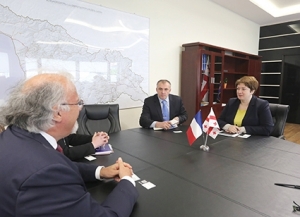France, a Discreet Partner in Georgian Economic & Cultural Development
Exclusive Interview
At first sight, France might seem distant to the Georgians, but if we take a closer look, we realize that Georgia benefits from France in many ways, including business, culture, and policy. GEORGIA TODAY met with Ambassador of France to Georgia Pascal Meunier, here since 2016, who agreed to answer to our questions.
Pascal Meunier first worked for the Ministry of Foreign Affairs. Then, after serving in the French embassies in the Czech Republic, Poland, Sweden and Japan, he switched to the private sector by working for Thales (former Thomson-CSF). Thereafter, he was appointed Ambassador to Azerbaijan in 2012 and to Georgia in 2016.
Let’s talk about French Business
France is among the 10th main investors in Georgia. Of course, Azerbaijan is the first, and the United Kingdom maintains high investments thanks to BP. It is one of the oil leaders operating in Georgia today, a country serving as a crossing point between Azerbaijan and Europe. But, France should not be overlooked. One of our best successes has been Lactalis, a key investor in the country thanks to the acquisition of Santé but also a partner of our flagship project, the Franco-Georgian university, for the creation of which an intergovernmental agreement was signed during our foreign minister’s visit on May 26. This one focuses on agriculture (including viticulture and food safety) tourism and computer sciences. Possibilities of internships are offered to students as part of their training.
Then there is Orange Group and it is affiliated company Sofrecom which just opened a branch office in Tbilisi. They have developed a fruitful cooperation with Silknet/ Geocell group which will have a huge impact on Georgia’s capabilities in state-of-the-art IT services.
France doesn’t only focus on Tbilisi; we have invested in Batumi and Kutaisi (Atlantic Group electrical heaters) and will soon do so in Telavi. In Batumi, a French SME launched a large-scale public bicycle sharing system. The Georgian region of Kakheti benefits from wine technology transfers, and Georgia received recognition within the recent Bordeaux exhibition as being the cradle of wine. It also benefits from a string cooperation with Yonne region in the field of treatment of hepatitis and tuberculosis So, yes, the French investment is strong.
In that case, why does French investment appear to be stagnating?
There are three barriers. The first is a lack of awareness. Investors know little about Georgia, and I plan to speak to the MEDEF (the Movement of the Enterprises of France) in September. The second problem is a lack of financial means on the Georgian side. In terms of rail transport for instance, France has old know-how, and Alstom, a multinational company operating worldwide in rail transport markets, passenger transportation, signaling and locomotives - could support Georgia to modernize its network. Then, tenders here are often divided into small packages in order to promote local business, whereas French groups prefer to work on the whole project, sharing their expertise in engineering. We are promoting different concepts of procurement of sophisticated infrastructure such as Public Private Partnership schemes and the Design & Build concept where a constructor is responsible for the whole project or can propose alternative solutions. According to an American study, such a method gives an average of 10 to 15% cost savings in comparison with the traditional procurement through tenders where the design is made by a consultant.
What will the next step be for French collaboration?
Georgia plans to enhance its roads and build highways. France is well placed for it. In addition, in terms of environment, Veolia and Suez, French companies working in the field of water management, waste management, transport and energy services, are already operating on the territory and currently are working on tenders that I hope they will get. In the coming years, Georgia will be facing environmental issues which could affect tourism. The government is working on it, and we are eager to bring state of the art know-how. I am optimistic and confident that in the coming months, we will achieve some results.
Why should a firm invest in Georgia?
Georgia is a safe country. There is no doubt that it is a democracy free of corruption. Georgia is the “success story” of the Eastern Partnership. Moreover, the country is the link between West and East and is developing itself. $5 billion projects are funded by international financial institutions here. So there is room for French companies to compete and win projects.
What is the key success of the European Association Agreement?
You are right to mention the European Union, which is the main partner for Georgia. One of the successes related to the Agreement has been the end of the visa regime. Georgian citizens are free to spend three months in the EU without a visa in a period of six months. But there is a lot of other benefits Georgia gets from the EU in the field of agriculture, for instance, through ENO. In the autumn, Jean-Claude Juncker [President of the European Commission] alongside different commissioners, will meet the Georgian Prime Minister and members of Georgian government to review in a high-level new format the different aspects of EU-Georgia cooperation. That reflects the EU’s commitment to Georgia.
How do you explain the recent decrease in Europhilia here?
It is quite hard to answer. Georgia remains a Europhile, but yes … I suspect it is related to an increase in income disparities. As UNICEF pointed out in a recent report, the level of poverty is still high and not everybody feels the benefits of the Association treaty in the population. Some people argue that the EU funds go essentially to European consultants and NGOs, or to large companies close to the government, leaving them unemployed.
It is something on which the EU will work by enhancing its communication about funded projects which have a direct impact on the population.
By Antoine Dewaest











